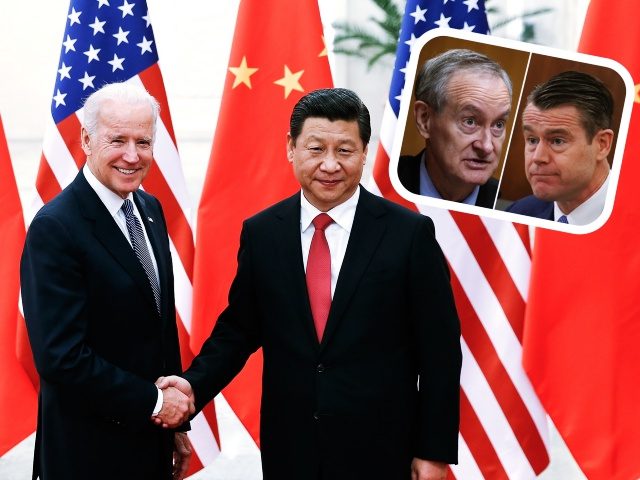A couple of Senate Republicans are working to help President Joe Biden cut United States tariffs on China-made products just as American voters overwhelmingly say they support more tariffs, not less.
Sens. Mike Crapo (R-ID) and Todd Young (IN) are reportedly working to ensure that U.S. tariffs on China are reduced as part of the Senate version of the America COMPETES Act. Those tariff-cutting provisions have been opposed by Sens. Tom Cotton (R-AR), Marco Rubio (R-FL), and Josh Hawley (R-MO), all of whom represent the party’s populist wing.
Politico reports:
Instead, Republicans are pushing to approve the Senate version of the legislation, which would roll back some of Trump’s tariffs on China — something the Biden administration has been reluctant to do. And they’re threatening to pull their support for the legislation entirely if certain House trade proposals are approved by the conference committee currently negotiating the final text. Given that the final legislation will ultimately need GOP votes to get through the Senate, that gives the more traditional, pro-trade wing of the party the upper hand in the negotiations — bucking protectionist impulses that have been on the rise in both parties in recent years. [Emphasis added]
The Senate bill “needs to be the foundation” of what comes out of the conference committee, said Senate Finance Committee Ranking Member Mike Crapo (Idaho), who crafted the Senate trade title with committee Chair Ron Wyden (Ore.) and has called for a more “thoughtful” application of Trump’s China tariffs. He was echoed by Sen. Todd Young (Ind.), the lead GOP sponsor of the China legislation in the Senate, who said the final product would have to “resemble fairly closely the Senate bill in order to retain Republican support.” [Emphasis added]
The U.S.-China Business Council — representing the nation’s largest multinational corporations that make their products in China, including the Coca-Cola Company, Bank of America, Amazon, and the Walt Disney Company — is lobbying for the U.S. tariff cuts in the Senate version of the bill.
In doing so, Senate Republicans would be hugely aiding Biden, who has attempted to skate between the free trade wing of his party and the economic populists in his administration.
Last March, Biden’s United States Trade Representative (USTR), Katherine Tai, announced the elimination of Section 301 tariffs on more than 350 products made in China that are imported to the U.S. market. Cotton has asked the administration to explain why they cut tariffs.
White House officials and Treasury Secretary Janet Yellen have sought to blame inflation not on the administration’s high spending and stimulus funds but rather on U.S. tariffs on China.
Matt Stoller with the American Economic Liberties Project wrote that “tariffs are irrelevant to inflation.”
“We can’t get anything through the ports and Shanghai/Beijing are physically shut down,” Stoller wrote in a post. “The only thing eroding tariffs will do is stop businesses from reshoring production to the U.S.”
Meanwhile, a new Morning Consult/Coalition for a Prosperous America poll shows American registered voters are overwhelmingly supportive of tariffs on foreign imports. For example, 73 percent of Americans said they support trade remedies to protect American jobs and workers from China, while 61 percent said they are more likely to back candidates for office who support tariffs on China-made products.
The poll also found that 71 percent of Americans support Section 301 tariffs on China-made products and 61 percent believe that U.S.-China free trade has made the nation overly dependent on Chinese imports.
From 2001 to 2018, U.S. free trade with China eliminated 3.7 million American jobs from the economy — 2.8 million of which were lost in American manufacturing. During that same period, at least 50,000 American manufacturing plants closed down.
Those massive job losses have coincided with a booming U.S.-China trade deficit. In 1985, before China entered the WTO, the U.S. trade deficit with China totaled $6 billion. In 2019, the U.S. trade deficit with China totaled more than $345 billion.
Meanwhile, a study from 2019 found that permanent U.S. tariffs of 25 percent on all Chinese imports would create more than a million American jobs in five years. American manufacturing is vital to the U.S. economy, as every one manufacturing job supports an additional 7.4 American jobs in other industries.
John Binder is a reporter for Breitbart News. Email him at jbinder@breitbart.com. Follow him on Twitter here.

COMMENTS
Please let us know if you're having issues with commenting.